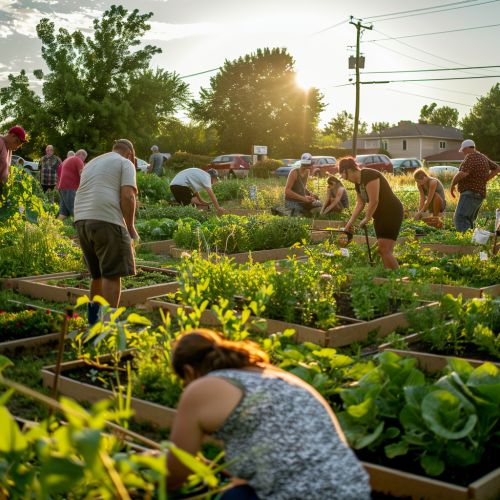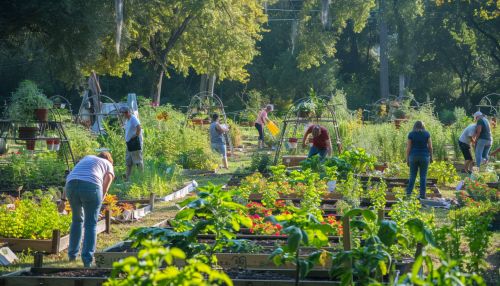Community gardens
Introduction
A community garden is a single piece of land gardened collectively by a group of people. These gardens provide fresh produce and plants, as well as satisfying labor, neighborhood improvement, sense of community, and connection to the environment. They are publicly functioning in terms of ownership, access, and management, as well as typically owned in trust by local governments or nonprofits.
History
The concept of community gardens has a long history, dating back to ancient civilizations. In the late 19th and early 20th centuries, community gardens became particularly significant in urban areas during times of economic hardship. For example, during the Great Depression, community gardens, also known as "victory gardens," were promoted to supplement food rations and boost morale.
Types of Community Gardens
Community gardens can be categorized into several types based on their purpose and structure:
Allotment Gardens
Allotment gardens are divided into individual plots that are assigned to members of the community. Each member is responsible for their own plot, and the produce grown is typically for personal use.
Communal Gardens
In communal gardens, the entire garden space is tended collectively by the community. The produce is shared among the members or donated to local food banks.
Educational Gardens
Educational gardens are often associated with schools or community centers. They serve as outdoor classrooms where participants can learn about horticulture, ecology, and sustainable practices.
Therapeutic Gardens
Therapeutic gardens are designed to provide a healing environment for individuals with physical, emotional, or psychological needs. These gardens are often found in hospitals, rehabilitation centers, and senior living facilities.
Benefits of Community Gardens
Community gardens offer a multitude of benefits, including:
Social Benefits
Community gardens foster social interaction and community cohesion. They provide a space for people of diverse backgrounds to come together, share knowledge, and build relationships.
Environmental Benefits
Community gardens contribute to urban greening, reduce the urban heat island effect, and promote biodiversity. They also provide habitats for pollinators and other wildlife.
Health Benefits
Gardening is a physical activity that promotes physical health. Additionally, access to fresh produce can improve nutrition and reduce food insecurity.
Economic Benefits
Community gardens can reduce household food expenses and provide opportunities for local economic development. They can also increase property values in surrounding areas.
Challenges and Solutions
While community gardens offer numerous benefits, they also face several challenges:
Land Access
Securing land for community gardens can be difficult, especially in urban areas. Solutions include partnering with local governments, nonprofits, and private landowners to secure land access.
Funding
Community gardens often rely on grants, donations, and volunteer labor. Establishing a sustainable funding model is crucial for long-term success. This can include membership fees, fundraising events, and partnerships with local businesses.
Maintenance
Maintaining a community garden requires ongoing effort and resources. Developing a clear management plan and engaging community members in regular maintenance activities can help ensure the garden's sustainability.


Case Studies
New York City Community Gardens
New York City is home to over 600 community gardens, many of which are part of the GreenThumb program. These gardens have transformed vacant lots into vibrant green spaces, providing numerous social, environmental, and health benefits to local residents.
Detroit Urban Gardens
In Detroit, community gardens have played a crucial role in addressing food deserts and revitalizing neighborhoods. Organizations like The Greening of Detroit have been instrumental in supporting these efforts.
Havana Urban Agriculture
Havana, Cuba, is renowned for its extensive urban agriculture program, which includes numerous community gardens. These gardens have been essential in ensuring food security and promoting sustainable agricultural practices in the city.
